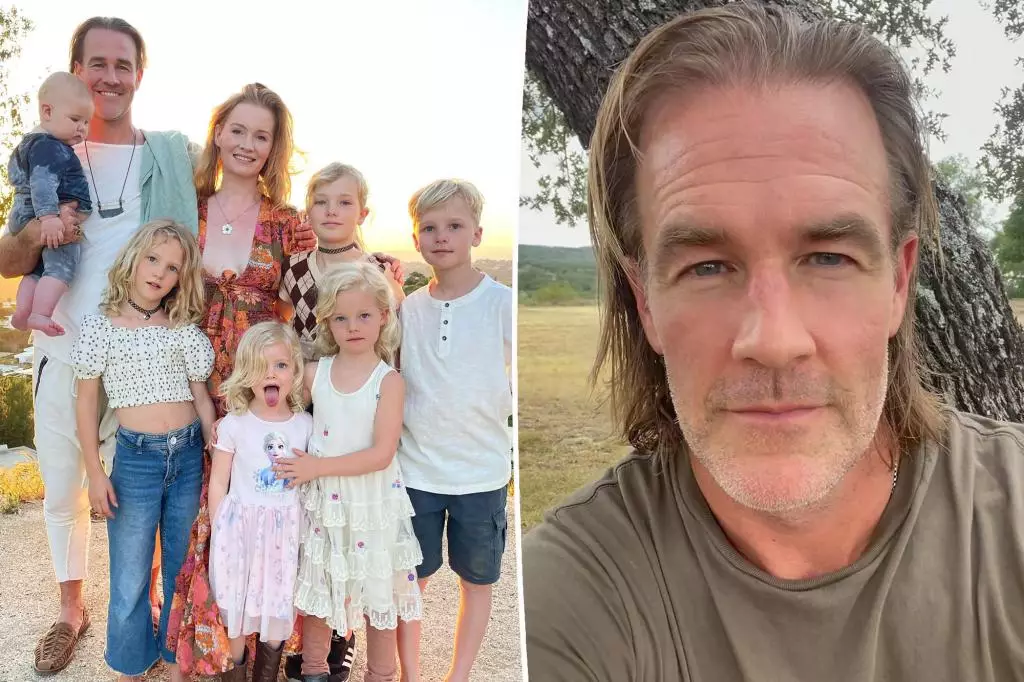In a world where health risks are often stigmatized or swept under the rug, James Van Der Beek exemplifies transparency and resilience. Recently, the actor revealed his colorectal cancer diagnosis, a revelation that sits on top of his prior decision to undergo a vasectomy. This decision, he explains, was rooted in the overwhelming joy and chaos of parenting; Van Der Beek, at 47, is the father of six children, and he jokingly noted his lack of planning regarding their arrivals. “I figured the only way we’re going to stop [having kids] is if we have some medical intervention,” he stated during a candid interview with People Magazine. This heartfelt disclosure echoes a wider narrative concerning family planning and complex emotional ties that accompany parenthood.
Van Der Beek’s family includes his wife, Kimberly, and their six children: Olivia, Joshua, Annabel, Emilia, Gwen, and Jeremiah. His humorous acknowledgment of their struggle to control their family size—”we really sucked at not getting pregnant”—highlights a common reality among many parents. Amidst the chaos of family life, Van Der Beek speaks to a balance of gratitude and shock, emphasizing, “thank God, honestly, because it’s such a struggle for people,” reflecting on the unpredictability of life despite the challenges posed by frequent pregnancy losses, including Kimberly’s near-fatal miscarriage.
Breaking the Silence: The Reality of Cancer Diagnosis
Navigating through intense personal challenges, Van Der Beek’s announcement about his cancer diagnosis brings discussions of health challenges into the public eye. Most notably, he revealed his Stage 3 cancer diagnosis on social media, stating, “I’ve been privately dealing with this diagnosis… There’s reason for optimism, and I’m feeling good.” This openness not only fosters a supportive environment for his fans but also serves to humanize the often-misunderstood experience of battling cancer.
His decision to share such vulnerable information was strategically delayed. Van Der Beek intended to present his journey in his own words, hoping to raise awareness about the disease. “There’s no playbook for how [to] announce these things,” he candidly expressed. The proactive nature of his communication indicates an acute awareness of the responsibility public figures bear in handling sensitive health discussions, adding an extra layer of depth to his narrative.
At the core of Van Der Beek’s journey is the immense support from his family. While battling an illness, the emotional resilience he displays is largely influenced by those around him. The actor draws strength from his loved ones, recognizing their impact on his healing journey. In his statement, he recognized the vital role his family plays, implying that their support system is key in fostering a hopeful outlook. His words resonate with many caregivers who face adversity, portraying an inherent human experience that transcends celebrity culture.
Moreover, Van Der Beek’s willingness to discuss both his personal struggles and victories emphasizes an important lesson: vulnerability is not a weakness but a source of strength. As he stated, “I’m in a place of healing, my energy levels are great,” exemplifying the importance of maintaining hope and positivity in the face of disease.
Through his revelations, Van Der Beek encourages deeper discussion about not only colorectal cancer but also the emotional landscape surrounding chronic illnesses. His experience serves as a vital call to action for awareness and education on health issues that often remain in the shadows. By bringing his experiences to light, he challenges stigma, promotes understanding, and fosters a community of empathy.
As fans and fellow humans alike reflect on Van Der Beek’s story, they are prompted to consider their own narratives surrounding family, health, and the often-unspoken challenges of life. His journey is a testament to the power of speaking up, seeking help, and embracing every moment with gratitude amid life’s unpredictability.

Leave a Reply